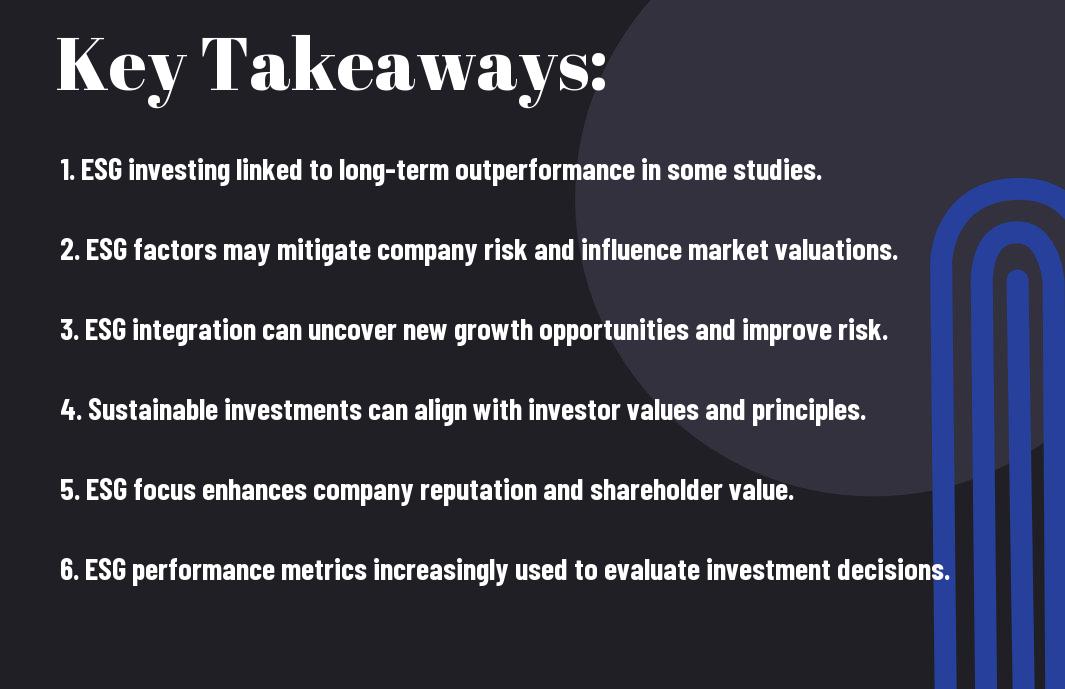#Returns In a world where sustainability and responsible investing are gaining momentum, the concept of Environmental, Social, and Governance (ESG) criteria has become increasingly important for investors. Many individuals and institutions are looking beyond traditional financial metrics and considering the long-term impact of their investments on society and the environment. However, a crucial question remains – does ESG investing actually deliver sustainable returns? To explore the potential benefits and pitfalls of ESG investing, let’s explore into the research and insights provided in a comprehensive report by J.P. Morgan Private Bank on How smart ESG investing could boost portfolio returns.

Understanding ESG Investing
Defining ESG Components
There’s a growing interest in ESG (Environmental, Social, and Governance) investing, as investors seek to align their values with their financial goals. ESG investing evaluates companies based on their performance in these three key areas.
The Evolution of ESG Criteria in Investment Strategies
Components within ESG investing have evolved significantly over time. Previously, companies were primarily assessed based on financial performance alone. Another important development has been the incorporation of ESG criteria into investment strategies, moving beyond a sole focus on profits to consider broader impacts.
Financial Performance of ESG Investments
Comparing ESG vs. Non-ESG Portfolios
An
| ESG Portfolios | Non-ESG Portfolios |
| Consistent long-term returns | Higher volatility |
| Lower risk of financial shocks | Exposure to unsustainable industries |
| Alignment with global sustainability goals | Short-term gains at the expense of long-term sustainability |
The Impact of ESG Scores on Investment Returns
One
Investors are increasingly recognizing that ESG factors can significantly impact the financial performance of their investments. Companies with higher ESG scores tend to outperform those with lower scores in the long run. By integrating ESG criteria into investment decisions, investors can mitigate risks and seize opportunities that align with sustainable practices.
With ESG integration, investors can benefit from improved performance, reduced exposure to risk, and contribute to a more sustainable future. Companies with strong ESG practices are better equipped to navigate challenges such as regulatory changes, resource scarcity, and changing consumer preferences. Investing in ESG-conscious companies ultimately leads to long-term value creation and resilience in the face of evolving market dynamics.
Challenges and Controversies in ESG Investing
For ESG AND FINANCIAL PERFORMANCE:, the increasing popularity of ESG investing has brought to light various challenges and controversies that investors must navigate. One of the significant hurdles in ESG investing is the difficulty in accurately measuring ESG performance.
The Problem of Measuring ESG Performance
For investors, the lack of standardized reporting frameworks and inconsistent data disclosure make it challenging to evaluate and compare ESG performance across companies accurately. This lack of standardized metrics not only complicates the investment decision-making process but also raises questions about the credibility and reliability of the reported ESG data.
Debating the Materiality of ESG Factors in Financial Returns
Financial experts and researchers continue to debate whether ESG factors have a material impact on financial returns. While some argue that integrating ESG considerations can lead to better risk-adjusted returns and long-term financial performance, others remain skeptical of the direct link between ESG and financial outcomes. Recognizing the differing opinions on the materiality of ESG factors is crucial for investors seeking to incorporate ESG into their investment strategies.
- Lack of standardized reporting frameworks
- Inconsistent data disclosure
- Questions about credibility and reliability of ESG data
The Future of ESG Investments
Regulatory Trends and Their Impact on ESG Investing
With the increasing focus on sustainability and responsible investing, regulatory bodies worldwide are moving towards enhancing ESG reporting standards and disclosure requirements. This shift is aimed at promoting transparency and accountability among companies, ensuring that investors have access to accurate and reliable ESG data. According to a recent article on An Inconvenient Truth About ESG Investing, these regulatory trends are expected to have a significant impact on the future of ESG investing, influencing investment decisions and shaping the landscape of sustainable finance.
ESG Integration in Mainstream Investment Portfolios
One of the key trends shaping the future of ESG investing is the integration of ESG factors into mainstream investment portfolios. As more investors recognize the long-term value that sustainable practices bring to businesses, there is a growing demand for ESG integration in investment strategies. This integration not only helps mitigate risk by identifying companies with strong ESG performance but also provides opportunities for sustainable returns as the global economy transitions towards a more sustainable future.
Another important aspect to consider is the growing emphasis on impact investing, where investors not only seek financial returns but also aim to generate positive social and environmental outcomes. By aligning investment decisions with ESG principles, investors can drive positive change while also contributing to a more sustainable and inclusive future.

Conclusion
With this in mind, ESG investing has shown promise in providing sustainable returns for investors while also promoting environmental and social change. By integrating environmental, social, and governance factors into investment decisions, companies are encouraged to operate in a more sustainable and responsible manner. While returns may vary depending on the investment strategy and market conditions, the long-term benefits of ESG investing are increasingly being recognized by investors and companies alike. As the demand for sustainable investing continues to grow, ESG considerations are likely to become even more influential in shaping the future of finance.